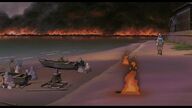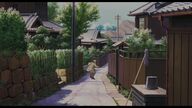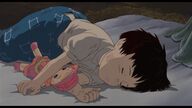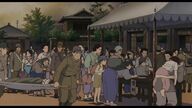This film is about a brother and sister who experienced a tragic life before and after Japan's defeat in 1945, until the death of the sister. From the point of view of human nature, the common people are too miserable, and the war is too terrible. No more wars. But the irony is that this movie was shot and produced by the country that started the war. When this movie was released, it was easy for the Japanese to think: the defeat was too tragic, the defeat was too terrible. If there is another war, don't lose it. It's as if a hooligan provoked a passerby on the street and beat a passerby, but he didn't hit him, but was counterattacked by passersby in self-defense. Then the hooligan cried and said, "Look at how miserable I am, look at how you beat me!" This kind of behavior is really too hooligan. In the eight years of China's Anti-Japanese War, more than 35 million people were killed and injured in China, and the direct and indirect economic losses reached 600 billion US dollars. the same life. Who do their souls complain to? However, this movie only chose a time to appear innocent, and use the identity of the victim to whitewash itself. Yes, I think the meaning of this movie should be "prosperity, the people suffer; death, the people suffer." The war launched by the government should not be at the expense of the people. But that is a matter of your own country, a matter of your own country, and you will resolve it within yourself. The government is chosen by you, and the government's decision to launch war is also a manifestation of the will of the whole people. If it really opposes the war and the people's grievances are boiling, the government will not make such a rash act. As an invaded country, our national hatred in the Anti-Japanese War was Japan, not a certain Japanese government. Japanese nationals exist as a whole. The Japanese people should also bear the consequences and pay the price for the war launched by their own country. This was the historical role that people in history had to assume at that time, and it was unavoidable, and there was no fairness or injustice. Losing the battle and bearing the consequences is not worth pity. If Japan succeeds in aggression against China, China becomes a colony, and the Chinese become slaves to subjugation, will the Japanese feel pity for the Chinese? There is no doubt that the answer is no, and if so, it will not start a war and invade China! This movie is too one-sided. Why is there no statement: In 1938, Japanese children all had to learn Bushido. At the age of seven, they had to wear black uniforms and recite the children's song "Sit side by side with big brother, I went to school today to thank the soldiers, thank the soldiers, They fought for their country, they fought for their country", bowing to the photo of the emperor placed in the center of the gate. History class and moral education class According to the Emperor's "Educational Edict", "loyalty is the highest virtue." Atsushi Kozawa, who was in the third grade of elementary school at the time, recalled in the letter: "The judo boxing match in the city hall, where the Japanese fought against the Americans, from beginning to end, the audience was excited, encouraging the judo players and scolding the boxers. In the end, the judo players were very excited. When we won the victory, the audience cheered loudly, and then a movie was shown. It was a battle scene of the 'Manchurian Incident'. Our army occupied the enemy's territory, raised the flag of the sun, and the audience applauded vigorously." After Qi suffered the atomic bomb, among the survivors, there were still some who felt that it was better to launch a war of aggression, and should they continue to fight? ========= I am not trying to incite ethnic hatred, but I hope that the Chinese will not forget history and still be vigilant against Japan. The angle of the movie is so rude, yes, it depicts what may be the truth, but it is part of the truth, and part of the truth is more deceptive than a lie. He never mentioned the heinous crimes he committed in the war, only expressed his tragic situation after the defeat, and sought sympathy. But don't forget that in World War II, Japan was a fascist country, an aggressor country, and everything you suffered was your own sin. Some people may say that Japanese soldiers do not represent Japanese citizens, nor do they represent the Japanese people, and the common people are innocent. This sentence is good. But theory is theory and reality is reality. In such a world war, manslaughter of ordinary people is inevitable. Moreover, the protagonist in the film was not killed by guns, but died of poverty in the economic difficulties caused by the country's defeat. The reason for this should be the Japanese country's own reflection. There are two directions for this kind of reflection: 1. Reflect on the war. 2. Reflect on defeat. Once you go to "reflection defeat", it is very dangerous. Because the conclusion of this direction is: the next time you start a war, you must not lose. This will only lead to more wolf-minded barbarism. In this regard, we should not be sympathetic, but should be vigilant. It's a bit of a coincidence, yes, it describes what may be the truth, but it's a partial truth, and a partial truth is more deceptive than a lie. He never mentioned the heinous crimes he committed in the war, only expressed his tragic situation after the defeat, and sought sympathy. But don't forget that in World War II, Japan was a fascist country, an aggressor country, and everything you suffered was your own sin. Some people may say that Japanese soldiers do not represent Japanese citizens, nor do they represent the Japanese people, and the common people are innocent. This sentence is good. But theory is theory and reality is reality. In such a world war, manslaughter of ordinary people is inevitable. Moreover, the protagonist in the film was not killed by guns, but died of poverty in the economic difficulties caused by the country's defeat. The reason for this should be the Japanese country's own reflection. There are two directions for this kind of reflection: 1. Reflect on the war. 2. Reflect on defeat. Once you go to "reflection defeat", it is very dangerous. Because the conclusion of this direction is: the next time you start a war, you must not lose. This will only lead to more wolf-minded barbarism. In this regard, we should not be sympathetic, but should be vigilant. It's a bit of a coincidence, yes, it describes what may be the truth, but it's a partial truth, and a partial truth is more deceptive than a lie. He never mentioned the heinous crimes he committed in the war, only expressed his tragic situation after the defeat, and sought sympathy. But don't forget that in World War II, Japan was a fascist country, an aggressor country, and everything you suffered was your own sin. Some people may say that Japanese soldiers do not represent Japanese citizens, nor do they represent the Japanese people, and the common people are innocent. This sentence is good. But theory is theory and reality is reality. In such a world war, manslaughter of ordinary people is inevitable. Moreover, the protagonist in the film was not killed by guns, but died of poverty in the economic difficulties caused by the country's defeat. The reason for this should be the Japanese country's own reflection. There are two directions for this kind of reflection: 1. Reflect on the war. 2. Reflect on defeat. Once you go to "reflection defeat", it is very dangerous. Because the conclusion of this direction is: the next time you start a war, you must not lose. This will only lead to more wolf-minded barbarism. In this regard, we should not be sympathetic, but should be vigilant.
View more about Grave of the Fireflies reviews







